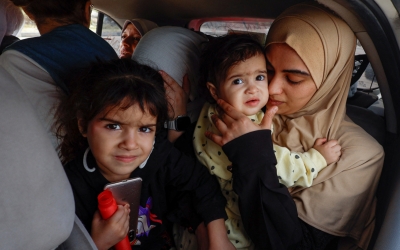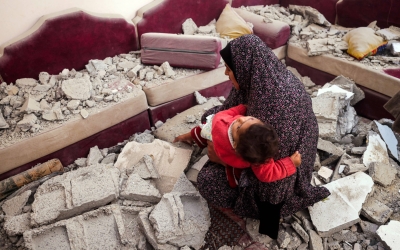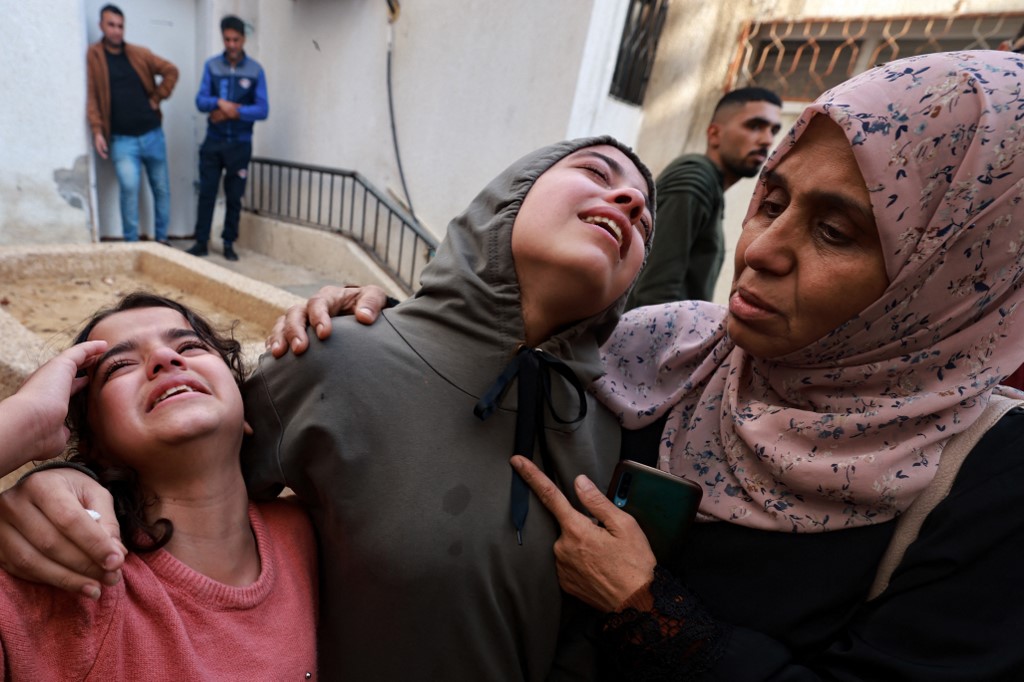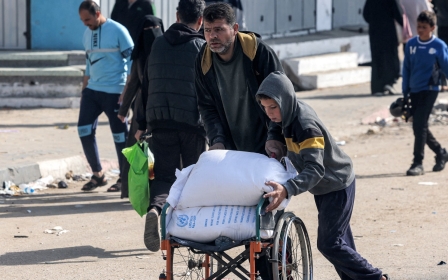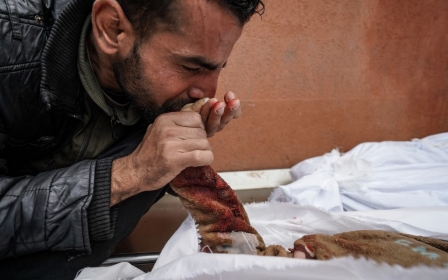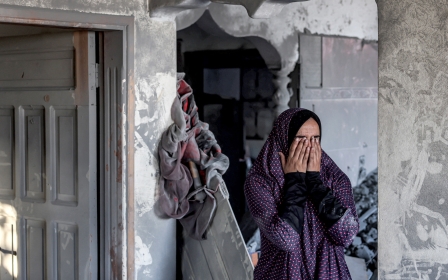War on Gaza: The reality of giving birth in a war zone
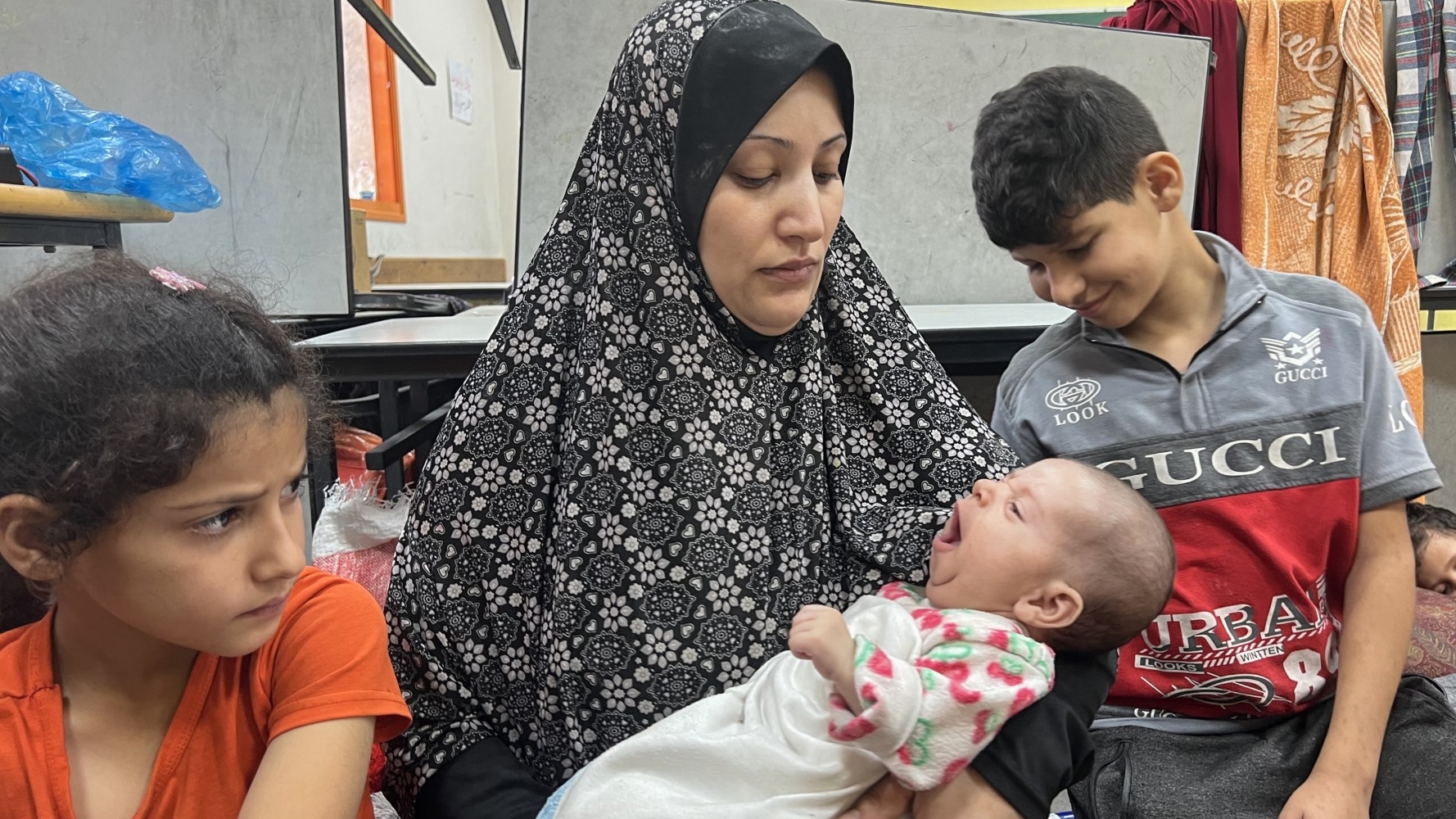
As the brutal Israeli assault on the Gaza Strip rages on, pregnant Palestinian women are grappling with the challenges of giving birth in a warzone and enduring the post-natal hardships that follow, including lack of medicine, food and water.
According to the World Health Organisation (WHO), there are around 50,000 pregnant women in Gaza and 180 new births per day.
Approximately 15 percent of these expectant mothers are predicted to face complications related to pregnancy or childbirth and require additional care.
Such care, which should normally be routine, is now a luxury for many mothers, with Israel blocking aid deliveries into Gaza and hospitals constantly being targeted.
Mothers are suffering acute mental distress, trying to keep a baby alive during a war that has killed tens of thousands of people, including more than 10,000 children.
New MEE newsletter: Jerusalem Dispatch
Sign up to get the latest insights and analysis on Israel-Palestine, alongside Turkey Unpacked and other MEE newsletters
Fedaa Issa is a 28-year-old mother of two who lived in Beit Lahia in the north of Gaza. Before the conflict started, she awaited excitedly the arrival of her new baby girl Aya.
“We counted down the days before Aya's arrival… my daughter Malak was so excited to have a sister to play with. However, the Israeli assault destroyed our dream,” Issa said.
'The happiness turned into worry and fear. Pregnancy became a burden on my heart'
- Fedaa Issa
“The happiness turned into worry and fear. Pregnancy became a burden on my heart.”
Fedaa fled her home on 14 October after her brother-in-law received a notice from the Israeli army demanding they leave the house.
Issa left immediately with her two children Amir and Malak, fearing for the fate of her unborn child.
"It was extremely horrific for me to take care of a soul inside my womb while managing my steps."
Twenty minutes into the escape, Fedaa started bleeding from the exertion.
Seeking refuge, she and her family headed to a friend's house in a neighbouring area, only for missiles to land nearby, forcing them to evacuate southward.
For Palestinians, the ancestral memory of displacement is something they are raised with.
The majority of Gaza’s residents are either those expelled by Zionist militias during the Nakba of 1948 or their descendants.
"While escaping, I could not help but remember the tragic stories my beloved grandmother used to share about the Palestinian Nakba,” Issa said.
“The forced displacement, moving from one house to another, and the relentless bombardment. It is all happening again. I am witnessing it, and so are my children."
Finding refuge
After reaching southern Gaza, Issa and her family thought they had escaped death, believing the south would be relatively untouched by the conflict.
But a week later, they were proven wrong when shrapnel started falling in the area.
“I felt extremely overwhelmed and exhausted - constantly shifting from one place to another in pursuit of safety for my children. It emotionally drained us," Issa recalled.
Realising the south was no better than the north, she decided to return to the north and sought refuge at the Kamal Adwan Hospital, where her mother was living.
"My mum comforted me, assuring me that the war would end. She encouraged me to prepare the most beautiful clothes for my baby. Everything is easier with my mother by my side,” she said.
At the hospital, however, she witnessed what giving birth in Gaza would entail.
Dozens of pregnant women had sought refuge at the hospital and were close to delivering their children.
"I witnessed a woman in her 30th (week) who lost contractions due to fear. She was forced to undergo a C-section,” Issa said.
"These women were giving birth amid hellish scenes, with dead bodies scattered all around them," she said.
"I've seen bodies arriving at the hospital, left unburied for days, waiting for their families to identify them.
“I walked through the wounded and bleeding; they had no doctors to treat them.
“Pregnant women were giving birth, screaming in labour, with no midwives or anaesthetics available for C-sections."
Issa described a scene that illustrates what a failed health system looks like. There were few doctors or nurses available to treat the injured, process the dead and help pregnant women.
“I fell into depression,” she said.
Forced to move again
Gaza’s health system has suffered under years of an Israeli blockade on the territory, which left it struggling to treat its residents.
The war that began on 7 October, however, has led to the destruction of many of the area’s largest hospitals, as Israel has made them targets of its war against Hamas.
Early in the war, it justified its attacks on Gaza City’s al-Shifa hospital, claiming it housed an underground Hamas base.
Those claims were later proved false, but that has not stopped Israel from targeting other hospitals.
When Israel turned its focus on the Indonesian Hospital, Issa rightfully feared Kamal Adwan would be next and decided to move again towards the south, for the sake of her unborn child.
“I wiped away my tears and decided to be strong for my children. I begged my mother to join me. I told her I wanted to stay with her, to die with her, but I was desperate, helpless, pregnant, incapable of giving birth [at Kamal Adwan Hospital].”
Her mother told Issa that she was not willing to move again and eventually, Issa left with her husband and family, leaving her mother behind.
“I prayed to God for strength. I thanked my mother for all she did for me and left with my husband."
This time the journey to seek refuge would have new difficulties.
Encountering Israelis
While heading south, Issa found that Israeli occupation forces had established checkpoints on the roads they had designated safe for travel.
Issa said that they were made to wait at the checkpoint for five hours between 10am and 3pm, alongside other Palestinians, as Israeli soldiers deliberately fired over their heads to “toy” with their nerves.
During the ordeal, Issa was not allowed to sit down despite being visibly pregnant and Israel soldiers searched her, stealing money, gold and other valuables.
'One soldier approached me and ordered me to stand up and sit down for over 30 minutes, despite being aware of my pregnancy'
- Fedaa Issa
"One soldier approached me and ordered me to stand up and sit down for over 30 minutes, despite being aware of my pregnancy,” Issa recalled
“The continuous change between standing and sitting, with my belly in front of me was painful. I started bleeding again and the blood was all over my clothes but I could not complain.
“Tears streamed down my cheeks. At that moment, I wished I were not pregnant."
Issa described those who did not follow orders as being summarily shot and killed.
Such accounts of summary executions are not isolated and have been reported before by Middle East Eye.
By early evening, Issa and her family were allowed through to southern Gaza along with hundreds of other families, braving the bombardment around them.
Speaking of the symbolism of that moment, Issa said: "I truly lived through the Palestinian Nakba. I remembered all of my grandmother’s advice - to hold my children, otherwise I might lose them. To carry my belongings properly, otherwise they will be gone. I learned from her mistakes in the 1948 Nakba.”
She added that she called out the names of her children regularly to ensure they were still beside her and that she would not lose them.
Giving birth in Khan Younis
With rain pouring down and wind blowing against them, Issa and her family made it to Khan Younis at midnight.
There they set up a tent with another family and began getting used to a new way of living.
"I ended up with clothes soaked in rain, dirty with blood, and no private place to shower or sleep in,” Issa said.
Throughout November, she developed a new routine in the tent camp: waking up at 7am to stand in line for two to three hours for bread or to use the communal toilets in the area.
By 1 December, her new way of living was taking its toll on her and she decided to visit Nasser Hospital to undergo a check-up.
While the due date was on 25 December, doctors decided that the baby was in danger due to an excess of amniotic fluid and arranged for a caesarean the next day.
“All I wished for was my mum to hold my hand and assure me that everything would be fine, but there was no hope," she recalled.
On the day of the procedure, the doctors only had enough medicine to partially anaesthetise Issa for the operation.
Noticing her anxiety, however, Issa was reassured by one of the medics involved.
"Doctor Adnan had a reassuring smile on his face and comforted me, assuring me that the procedure would be easy and straightforward when he noticed my fear.”
Post natal suffering
Aya was born on 2 December and for Issa the joy of birth soon gave way to post-natal suffering.
She had to return to her tent immediately after the birth, as beds needed to be made free for new arrivals.
In the camp, she lacked the sanitation facilities to help her through the first few days and weeks of Aya’s life, and there was no proper sense of privacy.
Issa said that she and other women had no access to sanitary towels and instead risked infection by rewashing pieces of cloth in dirty water.
"My body shivered from the intense cold. I only had one blanket to cover myself and my baby. My blood count (was low) and I was supposed to receive supportive blood units, but there were none available in the hospital.”
The doctor advised Issa to follow a healthy diet and consume fruits and vegetables to help her wound heal, and to be able to have enough nutrients to breastfeed her child.
'I only had one blanket to cover myself and my baby'
- Fedaa Issa
"I had no access to nutrients to regain my blood count. The doctor advised me to stay away from bread and cheese, but the first thing I ate was bread and cheese because I had nothing else."
The lack of nutrients means that Issa is no longer able to breastfeed and Aya has to rely on formula milk. “She is currently dependent on formula milk, but we cannot afford it," Issa said.
Before the war, a box of formula cost around 18 shekels ($4.75) but since the conflict started, it can cost as much as 50 shekels ($13) depending on availability.
Unable to acquire a kettle to purify water, Issa has to boil water using stove fires that she has set up herself. However, despite boiling the water, Aya continues to suffer from gastric problems.
“I put water in the baby bottle as if it were milk to stop her from crying," Issa explained.
Every aspect of the birth and Aya’s new life has proven difficult.
"Aya was born with no clothes at all. My husband bought second-hand clothes from a nearby shop.
"I felt bad for not being able to provide for her."
Middle East Eye delivers independent and unrivalled coverage and analysis of the Middle East, North Africa and beyond. To learn more about republishing this content and the associated fees, please fill out this form. More about MEE can be found here.


